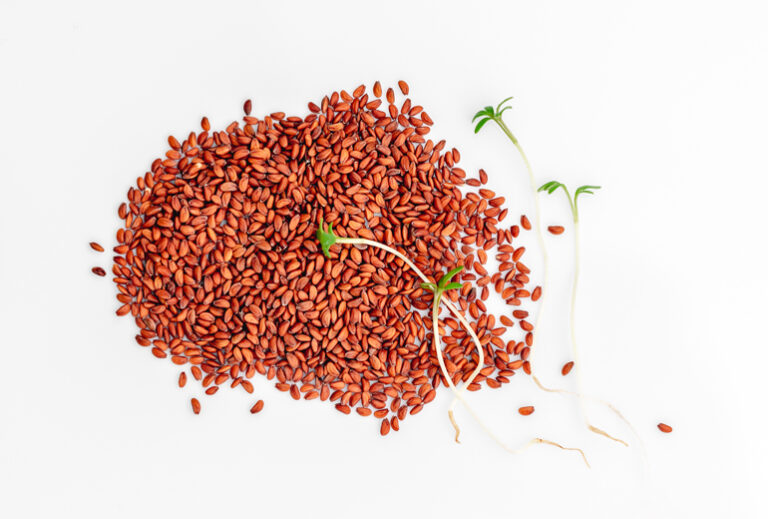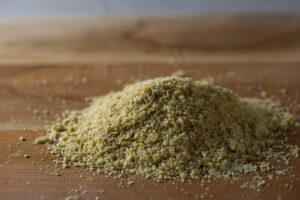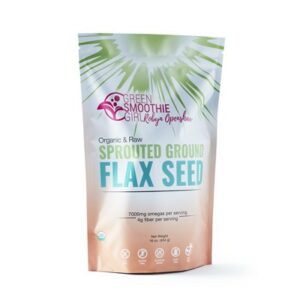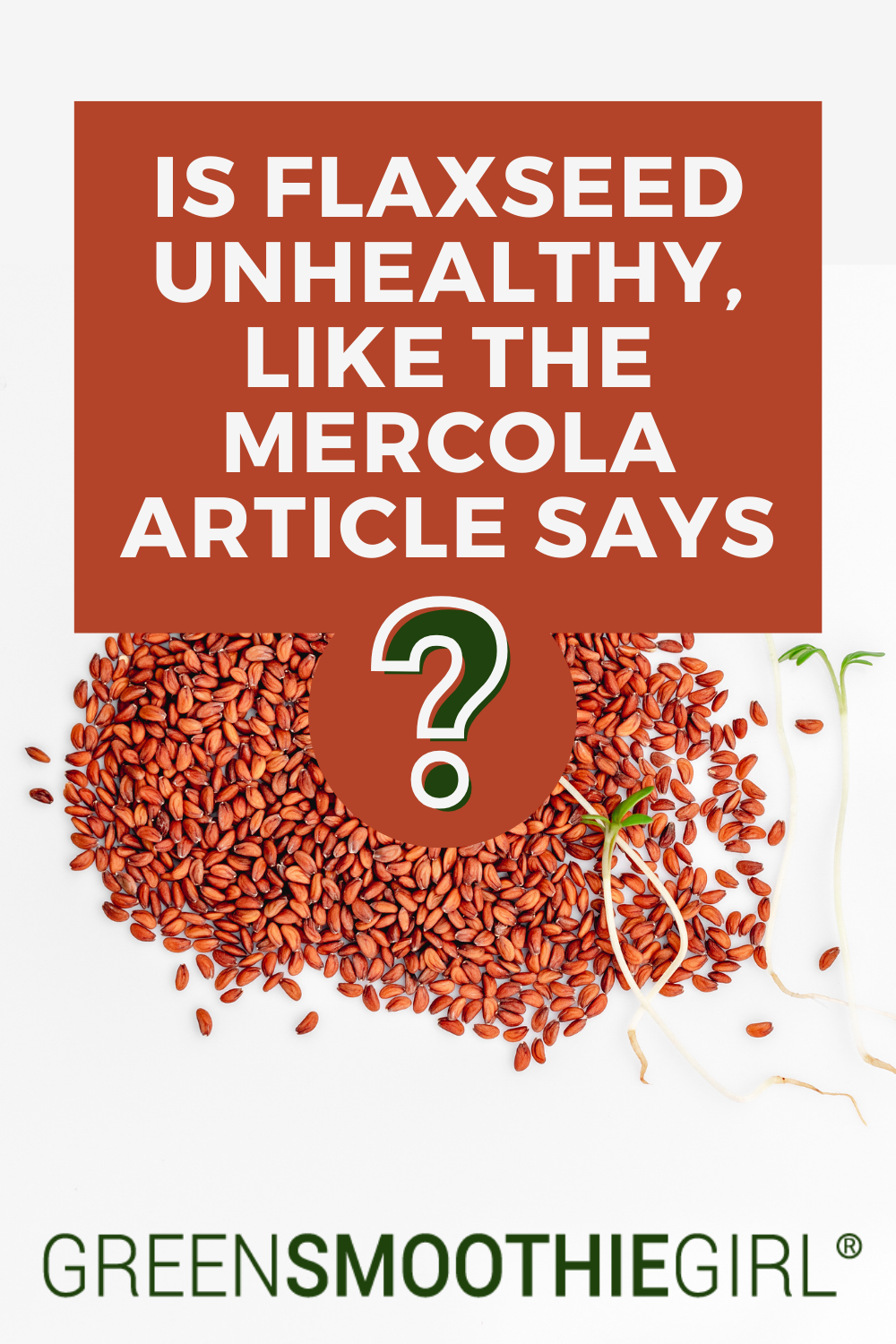Is Flaxseed Unhealthy, Like the Mercola Article Says?

Dear GreenSmoothieGirl: What do you think about the article published by the Mercola company claiming that flaxseed is an unhealthy food? Why is Dr. Mercola saying flax is bad?
After 27 years of research, I’m a huge fan of flaxseed.
I even call it a “miracle food” because it’s affordable, has a long shelf-life, and has incredible health-giving properties.
Plus, you can use it so many ways. Add it to green smoothies, steel-cut oats, homemade granola, a bowl of berries, in a sauce.
So, if flaxseed is so amazing for your health, why is an article published on Mercola saying it’s unhealthy? What’s the truth?
What You Need to Know About the Mercola Flax Article
The first thing you should know is that the article on Mercola isn’t written by Joe Mercola.
The author of this article is a young lady in her 20s who appears to be trading free writing for the chance to run an ad at the bottom of the Mercola page, where she sells a course with her sister telling you how to eat and live. She says it’s worth $3,500, but she’ll offer it to you for $29/month.
The article's premise is that flax has been used to make industrial oil, which is then used as an ingredient in paint.
It’s an interesting fact, but it doesn’t affect whether whole, organic flaxseed is good for you.
The argument that because processed flax has been used to make industrial paint products, you shouldn’t eat organic, whole flaxseed is like saying that because some companies make high-fructose corn syrup, therefore you shouldn’t eat the sweet corn grown by a local farmer or in your backyard.
The author also says that flax when made into oil oxidizes quickly, and oxidized oils can be carcinogenic. Fair enough.
But that doesn’t mean whole, or ground, flaxseed is unhealthy.
3 Healthy Reasons to Eat More Flaxseed

Ground flaxseed makes it easy for your body to digest and gain all the nutrients.
#1 — Flaxseed is high in fiber
#2 — Flaxseed is high in beneficial lignans
Higher than any other food, in fact.
#3 — Flaxseed is high in omega-3 fatty acids
Essential omega-3s are scarce in the American diet. We get very little omega-3s and way too much omega-6s with all the fried foods and seed oils.
The Fundamental Fallacy of The Author’s Argument
The flax products this young lady is talking about being bad for you are highly processed and preserved industrial oils made from flax.
I agree that paint is toxic, and flax has been used in paint. You shouldn’t eat paint or any industrial product made with flax oil.
But, it’s a major fallacy to say that flaxseed is bad for you because they make paint from it.
Here are a few examples to highlight the fallacy of her argument:
- Organic corn is good for you, even though they also make toxic products from genetically modified, glyphosate-sprayed corn.
- Organic legumes are good for you, even though toxic products like Jif peanut butter, and candy bars, are made from the peanut legume.
- Organic grapes are good for you even though they make wine from them, and alcohol is bad for you.
- Similarly, organic potatoes are good for you, even though they can make vodka from them.
I could go on endlessly with examples of similar arguments. But let me give you one more:
Her argument is like saying that you should avoid vegetables because toxic, rancid “vegetable oil” is bad for you.
Would I Use Flax Oil?
Flax oil oxidizes rapidly, which is why I wouldn’t use flax oil in cooking.
I only use flax oil – if at all – if it’s refrigerated, high-quality, no-solvents-involved oil, in a dark bottle, used cold, for a specific reason.
If you use flaxseed at all, like drizzling it on a baked potato instead of butter, you want to do so in limited amounts. It’s important not to cook with flaxseed oil.
Flax oil going rancid quickly is not a reason, however, to avoid one of the most nutrient-spectacular foods available to us: whole flaxseed.
The author published on Mercola talks about PUFAs, or polyunsaturated fatty acids.
But the real problem in our diet is processed oils everywhere – oils made from corn, soy, and seeds. The problem is not the flaxseed itself.
I would never suggest you use industrial oil products in your diet. The flax with all the studies behind it is the whole flaxseed.
And to make it even more amazing, sprout it. Then, to keep it around for a while before using it, dehydrate it below 100 degrees – then it’s just phenomenally nutritious food.
What About the Lignans in Flax?
Another thing I take issue with about the flax article published on Mercola is lignans.
The author says that lignans, which are a compound in many whole foods but are higher in flax, are somehow linked to breast cancer.
This is a bizarre claim because many research studies show the opposite of that.
In truth, consuming whole flaxseed, even a few times a week, in large part due to lignans, is linked to very LOW breast cancer risk.
A major meta-study reviewed the evidence about lignans in plant foods.1
The researchers found that lignans in plant foods are preventative of:
- Cardiovascular disease
- Diabetes
- Lupus
- Bone disorders
- Kidney disorders
- Menopause
- Reproductive problems
- Mental problems
- Immunity problems
- Atherosclerosis
- Liver necrosis and
- Urinary disorders
Due to the properties of lignans in flax that are:
- Anti-inflammatory
- Antioxidant
- Antimutagenic
- Antimicrobial
- Anti-obesity
- Antihypolipidemic, and
- Neuroprotective
Perhaps the author of the article Mercola published doesn’t understand that some synthetic, concentrated estrogens in the body that are associated with breast cancer are very different from the mild plant estrogens of flaxseed and many other whole foods.
In these whole foods, the fiber is mopping up excess estrogens. Think of lignans like a sponge in your GI tract. You need insoluble fiber, which is like a broom, and you need soluble fiber, which is like a sponge.
The evidence that lignans are powerful against the most common American diseases is so significant that, like the supplement industry tries to do with everything, they’ve isolated lignans and put them in a supplement pill bottle!
I don’t know why we’d want to extract an isolated compound from flaxseed when organic, sprouted flaxseed is inexpensive, and it’s the “whole food” that has been proven by so many studies to be cancer-preventive.
Science doesn’t know how all the cofactor nutrients in the whole flaxseed work together to achieve the positive results documented in so many studies.
The Truth: Sprouted Flaxseed Is Spectacular for You

After 18 years at GreenSmoothieGirl, there are very few things I think are so special that I’m willing to make them myself for you.
Organic, sprouted flaxseed is one of only a few that is that spectacular.
A tablespoon or two of organic, sprouted, ground flaxseed in your green smoothie is filling, nutritious, and high in fiber.
Plus, the omega-3 fatty acids are something your cardiovascular system and nervous system need every day. But, they have to come from food, because they can’t be manufactured by the body, like many nutrients can be.
Working with flaxseed yourself at home can be frustrating. When you soak it to sprout it, it gets thick and goopy. So, not many people want to soak and sprout it, let alone dehydrate it at a low temperature.
To make it easy for you, we dehydrate it at a low temperature to avoid killing enzymes, and then we seal it in an EVOH bag, so that it lasts for years in your food storage without oxidizing, i.e. going rancid.
No processing. No chemistry is involved. No extra ingredients are added.

Disclosure: This post may contain affiliate links that help support the GSG mission without costing you extra. I recommend only companies and products that I use myself.

References
- Imran, M., Ahmad, N., Anjum, F. M., Khan, M. K., Mushtaq, Z., Nadeem, M., & Hussain, S. (2015). Potential protective properties of flax lignan secoisolariciresinol diglucoside. Nutrition journal, 14, 71. https://doi.org/10.1186/s12937-015-0059-3
Image Notes
- Ground flaxseed image used under the Creative Commons Attribution-Share Alike 2.0 Generic license by VeganBaking.net
Posted in: Natural Remedies, Supplements, Tools & Products, Whole Food















